Hand delivery of census forms coming to rural areas
According to Nevada Census 2020, beginning on Monday, May 18, the U.S. Census Bureau will begin its “update leave” operations, during which 2020 census forms are hand-delivered to residences that either do not have mail delivered to the physical location of the home or the mail delivery information for the residence cannot be verified.
This process is to ensure all Nevadans – particularly in rural communities – are counted.
“We want to make sure people who receive the hand-delivered census forms do not mistake them for an advertisement and accidentally throw them away,” Churchill County Commission Chair Pete Olsen said. “It’s critical that rural residents who may not receive mail service at their homes still participate in the census.”
The U.S. Census Bureau is prioritizing the health and safety of the public and its employees. Therefore, the update leave process will not require any interaction with residents.
Census workers will not ring doorbells or collect data during this phase and will wear personal protective equipment while in the field. Census questionnaires and instructions will be left at or in close proximity of the front doors of homes.
Nevadans have been able to complete their census questionnaire online, over the phone or by mailing in the form since mid-March. Many residences, however, particularly in rural parts of the state, have not received the physical form yet, since they are a part of the update leave phase of the national census.
As of May 14, Nevada’s self-response rate is 58.4%, compared to the U.S self-response rate of 59.3%. In addition to congressional and state representation, census data is used to help determine how much and where approximately $67 billion in federal funding for the next 10 years will be distributed throughout Nevada.
“We cannot rely solely on residents in the most populous counties in Nevada to be included in the census and expect to get our fair share of federal funding in the rural parts of the state,” said Carolyn Turner, executive director of the Nevada Rural Electric Association. “Nevadans living in rural counties must be counted. It’s our responsibility to respond to the census, whether it’s online, via phone, comes in the mail or is hand-delivered.”
Funding based on past census information helped support the United Way Food Shelter in Pershing County; road funds in Lyon, Mineral and Nye Counties; and transportation and other services for seniors in Humboldt, Hawthorne and Eureka Counties, to name a few.
The 2020 Census takes about 10 minutes to complete and asks for basic information. It is confidential, and it does not include questions about financial information, social security numbers, political elections or any other personal identification information.
Nye County response
Nevada Census 2020 reported in mid-May that response rates to the census in Nevada are trailing the rest of the nation, and rates in Nye County significantly trail the state overall.
Nevada’s self-response rate is 57.9%, compared to the U.S self-response rate, which is currently 58.7%. In Nye County, the response rate is 40.5%.
The top performing Nevada counties are Churchill (66%), Carson (63.2%) and Lyon (62%), while Henderson’s 68% response rate is tops among the state’s municipalities, followed by Fallon (67.7%) and Boulder City (66.1%).
On the other end of the scale, only 3.5% of residents in Esmeralda County have responded to the census. Other low-responding counties include Eurkea (12.2%) and Lincoln (12.1%), while Caliente (8.5%), Carlin (11.4%) and Wells (12.3%) are the lowest-responding municipalities.
Nevada Census 2020’s report stated completing the census can be done at home, either online at www.census.nv.gov, via phone at 844-330-2020 for English or 844-468-2020 for Spanish or by returning the hard copy that was mailed to each resident.
For every person counted, Nevada Census 2020 noted, the state stands to receive $2,000 each year in federal funding for 10 years, more than $67 billion over the next decade.
Programs that rely on census data to determine funding include Medicaid, health care centers, nutrition services for senior citizens, school breakfast programs, Head Start, Pell Grants, career and technical education grants, highway planning and construction money and rural water and waste systems money.
















